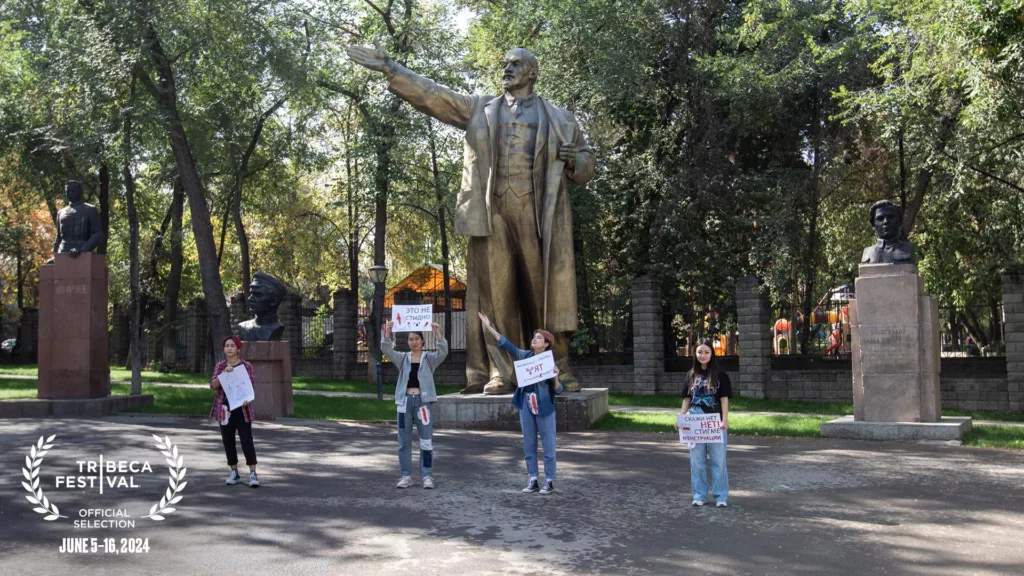Bikechess is a Kazakh film from writer-director Assel Aushakimova that explores daily life under authoritarian rule. The film focuses on Dina, a journalist working for a state TV station tasked with creating propaganda pieces promoting government initiatives. Saltanat Nauruz gives a strong performance as Dina, who grows disillusioned covering absurdly fabricated stories but sees few alternatives.
Dina’s stories become stranger, featuring a made-up sport fusing cycling and chess, scientists claiming human life began in Kazakhstan, and pointless government campaigns. Aushakimova bases these absurd reports on real Kazakh media, illuminating oppression through ridiculing its ridiculous artificial narratives. Joining Dina is her cameraman, portrayed subtly by Shyngys Beibituly, and her sister Zhanna, an activist confronting state oppression head-on, brought to life by Assel Abdimavlenova.
While following Dina’s propaganda assignments, the film observes ordinary people enduring censorship and control with resignation or rebellion. Aushakimova directs with an observational style, emphasizing the banality of compliance and the cost of dissent. Bikechess exposes life under regimes that manipulate truth, projecting authentic social issues onto manufactured public personas. Though some find its quiet tone slow, this nuanced look into conforming vs. resisting authority through surreal circumstances remains compelling.
Questioning Compliance
Our protagonist, Dina, works for Kazakhstan’s state TV, tasked with promoting absurd propaganda. Saltanat Nauruz brings Dina to life perfectly—you feel her growing disbelief covering stories like a strange new “bikechess” sport. But she sees no way out and continues this work.
Her younger sister Zhanna, played vibrantly by Assel Abdimavlenova, lives differently. As an outspoken activist fighting for change, she regularly clashes with authorities. These sisters demonstrate opposing ways of existing under oppression—Dina complies while Zhanna confronts the system.
Some propaganda pieces Dina reports are too ridiculous, like scientists claiming humans originated in Kazakhstan. In another, she films a meaningless police community event, where the officers show more interest in phones than people. The film sees humor in showcasing real absurdities people endure.
Dina also deals with personal problems, like an affair with her married cameraman, Shyngys Beibituly. Their complicated dynamic adds layers but ultimately peters out, perhaps the most realistic outcome given constraints they face.
Through Dina’s assignments, we experience her world and how those resisting like Zhanna continuously challenge state power structures. But most comply rather than disrupt the status quo, no matter how bizarre propaganda becomes. The characters encapsulate societal divides around conformity and rebellion under dictatorship.
Capturing Daily Absurdities
The cinematography of Bikechess really pulls you in. Aidar Ospanov opts for a minimalist, observational style that gives off a documentary vibe. It’s like the director Assel Aushakimova aims to truthfully show daily life. This lends authenticity as Dina covers her ridiculous propaganda assignments.
Aushakimova knows blending absurd comedy into realistic drama could easily go wrong. Instead, it’s woven together superbly. From the opening scene displaying the silly “bikechess” sport to policemen ignoring citizens, the ridiculous blends seamlessly with sincere portrayals of oppression. Whether amusing or dramatic, everything feels genuine.
We observe close-up as Dina experiences her world. Nothing feels superficial or staged, from talking with government workers to intimate moments with her sister. Aushakimova maintains a focus on relatable people that grounds the most absurd propaganda in reality.
This balancing act continues throughout small moments. Reaction shots capture nuanced feelings about enforced falsehoods. When protesters face brutality late in the film, the weight resonates because earlier scenes establish real stakes. Under the direction, Bikechess moves us with its authenticity even while finding humor in bleak situations.
Aushakimova shows daring in confronting censorship. But it’s her deft directorial hand ensuring both comedy and criticism land effectively that makes this story of living under authoritarianism compel long after the final frame. Some call it slow, but it subtly pulls you deep inside this world.
Defining Compliance and Rebellion
Saltanat Nauruz shines as Dina. She captures the journalist’s weariness perfectly—you feel her soul chipping away, covering absurd propaganda. Yet moments of understanding herself are subtle. When quietly doubting stories to her sister, Nauruz’s face speaks volumes. This layered portrayal brings Dina to life.
Assel Abdimavlenova sparks as fiery Zhanna. Where Dina complies, Zhanna confronts authority unapologetically. Abdimavlenova commands scenes with a rebellious spirit, enlivening other performances. Between these sisters lies the film’s focal point—conformity versus change.
Other characters lack the same depth. Shyngys Beibituly does well as Dina’s cameraman, but his role simplifies a complex dynamic. Assel’s lover remains background when she seems key to understanding her defiance. Expanding these characters may have strengthened Bikechess by further exploring conforming and resisting.
Yet Nauruz and Abdimavlenova anchor the film through their intertwining sisterhood. Where Dina accommodates oppression, watching costs mount for Zhanna, their bond remains caring, not critical. These lead performances dramatically bring the human truths of Bikechess to life despite some character simplification lessening impact. Overall, both actresses spark, carrying complex themes through lived-in portrayals.
Making Meaning from Madness
Bikechess finds bite in the bizarre through satire. The propaganda stories Dina covers are so ridiculous you can’t help laughing—from proposed sports like “bikechess” to scientists claiming life began in Kazakhstan. But this absurdity holds up a mirror to real examples in the country’s media.
Deeper themes also emerge. The film explores what it means to live under censorship, with the state dictating truth. Dina plays her role in spreading falsities, but her sister Zhanna rejects compromise, facing escalating persecution. Their divergence illustrates being controlled versus maintaining integrity.
Through this, Assel Aushakimova offers commentary beyond Kazakhstan. She critiques repression that manipulates people through artificial public personalities rather than addressing real issues. While propaganda aims to serve citizens, it only masks societal problems from view—just as Dina’s assignments gloss over hardships others endure.
Aushakimova’s observation of life within these constraints feels candid and makes her critiques land effectively. Scenes seem candid documentation, not overwrought sermonizing. Politicians disappear, leaving the people to represent power structures through everyday absurd encounters. Subtly reveals more than screaming.
Bikechess finds profundity in ridiculousness through marrying earnest realism with wry comedy. Its astute social observations stay thoughtful rather than accusatory. In doing so, it sparks reflection on repression universally rather than singling out any regime.
Finding Truth in Simplicity
What draws you deep into Bikechess’ world is how authentically it feels. Aidar Ospanov captures scenes with natural beauty through minimalist cinematography. Nothing feels needlessly flashy or polished—each frame adds depth.
The blending of realism with absurdist comedy flows perfectly. Though edited in a looser structure, the narrative thread remains clear. Scenes fuse serious drama with subtle humor in a way that leaves a lasting impact. With limited funds, Assel Aushakimova’s collaborative crew maximized artistic potential.
Restricting the musical score enhances this effect. Silence better highlights sparse dialogue and emotion in glare-filled reaction shots. Without trite soundtrack cues, viewers’ focus lands where intended. Technical elements emphasize content in a way more profound films twice their size fail to.
Small quibbles could note occasional pacing drags. But prioritizing message over rapid-fire plot devices, Bikechess sparks reflection. Its technical mastery lies in seamlessly guiding attention to critiques that outlive initial viewing. Simplicity becomes profound when facilitating truth’s pathway so skillfully. Finding depth within limitations’ constraints, bikes proves quality rises above gloss.
Finding Truth in the Absurd
Bikes confronts heavy themes through subtle absurdity. It critiques control over truth and passive conformity. Coercing reality. Aushakimova boldly commentates on life under repression, yet she does so accessibly through whimsical incompetence. Not accusatory condemnation.
This nuanced social perspective resonates because it candidly showcases humanity navigating such constraints. Small flaws fade. Beside crafting commentary so engagingly thought-provoking. Its artistry prioritizing authentic portrayals ensures impact surpassing any singular viewing.
While some find rhythm leisurely, this quality lends integrity. Slow-burning observation immerses one within difficult circumstances rendered with care, not judgment. Bikechess reminds us that repression transcends borders through uncommon yet universal absurdities.
For its successes far outweighing minor faults, this piece deserves acclaim. Aushakimova wields profundity within simplicity’s guise, crafting commentary to endure. Her societal mirror reflects truths worth continued reflection, affirming that cinema’s power for change remains uncensored.
The Review
Bikechess
In summary, Bikechess delivers an impactful critique of living under authoritarian rule through Aushakimova's deft blending of docudrama realism and absurdist humor. While not a perfectly polished film, its merits overwhelmingly offset minor flaws, with the director showing bravery in confronting censorship through her nuanced lens. Bikechess manages the challenging feat of holding an engaging, thought-provoking mirror up to societal repression, ensuring its searing commentary will continue sparking discussion.
PROS
- Authentic and nuanced portrayal of living under authoritarian rule
- Blends drama and satire seamlessly through absurdist humor based on real examples
- Strong performances, particularly from leads Saltanat Nauruz and Assel Abdimavlenova
- Minimalist style lends an intimate and impactful quality
CONS
- Slow pace won't appeal to all viewers
- Some characters feel slightly underdeveloped
- Low budget means rough edges at times



















































Discussion about this post